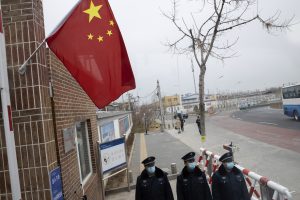“China is corrupt” – that simple, and often unquestioned, statement hides a deceptively complex web of assumptions. It’s easy to say a country is corrupt; far harder is defining that corruption, measuring it, and trying to understand the complicated relationship between corruption and economic growth. That’s the monumental project undertaken by Yuen Yuen Ang in her latest book, China’s Gilded Age: the Paradox of Economic Boom & Vast Corruption. Ang is a professor of political science and an Andrew Carnegie Fellow as well as the author of How China Escaped the Poverty Trap and China’s Gilded Age.
Her new book is especially timely, as the COVID-19 pandemic has cast a harsh spotlight on China’s political system even while calling into question its (and the world’s) continued economic growth. Below, The Diplomat interviews Ang about her research into corruption in China, its impact on the economy, and the connection to the country’s handling of the novel coronavirus.
Why has Xi Jinping spearheaded a high-profile anti-corruption drive since assuming China’s top post? Has Chinese governance markedly changed under this drive?
Indeed, for President Xi Jinping, fighting corruption is a cornerstone of his reign. A big reason is that he took office under perilous circumstances linked to corruption and factional rivalry. In 2012, Bo Xilai, Chongqing’s former Party secretary and one of Xi’s competitors for the top seat, was ousted, following a shocking scandal involving graft, murder, and a police chief’s escape to the U.S. embassy.
When Xi delivered his first speech before the Politburo (the elite body of the CCP), he warned that corruption had festered to a point of crisis and would “doom the party and the nation” if left untreated. Since then, Xi has launched the most vigorous anti-corruption campaign in his Party’s history. To date, it has disciplined more than 1.5 million officials.
What are the effects of this crackdown on the bureaucracy? In Chapter 6 of China’s Gilded Age, I conducted an analysis of the career paths of 331 city-level Party secretaries (the first-in-command of city governments) who were in office in 2011. Two patterns stand out. First, local leaders faced a high turnover rate – 16 percent were investigated for corruption – indicating an unusually volatile and stressful environment. Second, performance did not protect local officials from downfall, only patronage – whether the provincial Party bosses who appointed them survived the crackdown – did.
These findings suggest both a chilling climate in the bureaucracy and one in which having the right ties mattered more than doing the right thing. Bureaucratic inaction became so widespread that it inspired a Chinese term: “lazy governance” (lanzheng). The State Council publicly warned against it by shaming individual officials for dereliction of duty, delaying decisions, and leaving funds unused.
To be clear, Xi deserves credit for taking on the festering crisis of corruption, while previous leaders have swept it under the rug. If he successfully reins in crony capitalism, this will help create a fairer, cleaner business environment for China’s long-term growth. The problem is that his crackdown has gone beyond policing corruption and has expanded to emphasize conformity to the Party line and personal loyalty. Its sweeping and draconian nature has also terrified bureaucrats into inaction.
China’s Gilded Age will be released by Cambridge University Press in May 2020. The introduction is available here, and an audio excerpt of the book is available at this link.

































